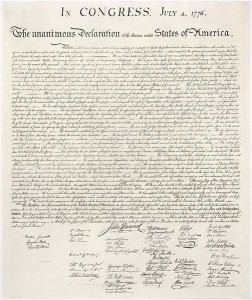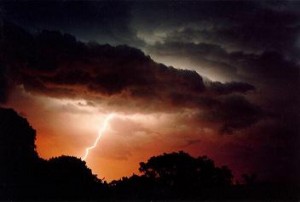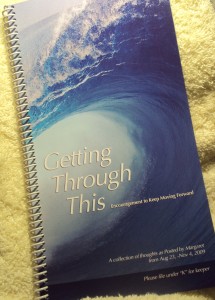This weekend is all about red, white and blue. Mom trained us well, and we, in turn, trained our kids: dress patriotically even if it’s out of style, and yes, a Cubs shirt will do just fine. Even Jack gets into the act, exchanging his purple collar for the old red one.
Our family, like many others, loves the colorful part of the holidays: red and pink for Valentine’s Day, yellow and purple for Easter, etc. Today it’s all about stars and stripes, flags and celebratory firewoks. Never mind that Nelson nearly lost his hand when a firecracker exploded too soon years ago. We still set them off with ooooh’s and aaaah’s after our hamburgers and baked beans.
But the 4th of July isn’t just about outfits and explosives. Yesterday I listened to a radio reading of the Declaration of Independence. Most of it is a list of the offenses suffered by the colonists under the rule of a British king. But the introduction and conclusion of the document describe the freedom these people craved. After paying the price of a bloody war, they finally did win self-rule and their independence. The 13 newly formed states became the beginning of our free nation.
It’s interesting that the Declaration’s first section, The Preamble, includes what may be the most memorized sentence in our country. School kids have recited it for centuries. It’s the one that starts with, “We hold these truths to be self-evident…” God is mentioned as the Creator and humankind as “the created.”
Most interesting to me, however, is the end of this sentence that says the colonists believed all citizens had the right to pursue personal happiness. It further described what should happen to a government if that pursuit is thwarted: at a minimum, it should be altered, but if that doesn’t work, it should be abolished completely. A new government should be formed that “shall seem most likely to affect their safety… and happiness.”
Although I’ve read the Declaration before, until yesterday I hadn’t noticed the double mention of personal happiness. We’re taught in the church (and also in Scripture) that seeking one’s own happiness is not a lofty goal. We’re to “look to the interests of others ahead of our own.”
I’m extremely thankful I live in the USA and can experience the freedoms mentioned in the Declaration of Independence. One of them is that I’m free to decide whether or not to make happiness a life objective. I don’t often wrestle with this, since putting myself last on the happy-list is difficult. On rare occasions when I do it, though, the strangest thing happens. Happiness results. It’s one of life’s thought-provoking illogicalities.
Today I’ve made an effort to count my blessings, and living in a free land is high on the list. I’m thankful for those who fought for my freedom and the 234 years American citizens have enjoyed its abundance. But the best freedom of all is my option to openly follow God’s recommendations for finding happiness. And his declaration, the Bible, trumps even the very important Declaration of Independence.
“You, my brothers, were called to be free. But do not use your freedom to indulge the sinful nature; rather serve one another in love.” (Galatians 5:13)






